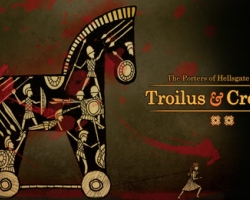The Porters of Hellsgate has taken on the daunting task of mounting one of Shakespeare’s problem plays with their production of Troilus and Cressida. Troilus and Cressida is considered a problem play because it doesn’t really fit into one of the classic Shakespearean categories – comedy, history, tragedy and romance – as it contains elements of all four.
Set during the Trojan War, Troilus and Cressida comes in toward the end of the war. The Trojans are faced with the dilemma of whether or not to return Helen to her husband Menelaus to bring a stop to the seemingly endless war. The Greeks are faced with the dilemma that Achilles has retired to his tent refusing to fight, which has left them without a champion. So when Hector puts forth a challenge of one on one battle, the Greeks are forced to come up with a new champion to face him.
Into this bloody backdrop, Shakespeare weaves in the love story of Troilus and Cressida. Troilus, a Trojan prince – youngest brother of Hector and Paris, falls in love with Cressida, a highborn woman. Using Pandarus, her uncle, as a liaison they are able to secretly meet and confess their mutual love for each other. However, they are immediately torn apart when her father arranges a prisoner of war to be released in exchange for Cressida. As the lovers are torn asunder, the true champions are thrust together and all ends in an epic battle.
Despite the very limited space in the Whitmore Theatre director Charles Pasternak conducts the flow of his 19 person cast easily and is able to create each scene using sparse set pieces. Also serving as the fight choreographer Pasternak uses stylized movement in the group fight sequences to great effect. The opening scene has a chaotic beauty to it as Helen, played by Eliza Kiss, delivers the prologue even as a battle rages behind her and she is stripped of her queenly title and stolen away by the Trojans. As the space is entirely too small for swordplay, Pasternak substitutes wrestling and uses knives to escalate the violence. The fighting style of Achilles, played by Matt Calloway, is not only impressive but profoundly differentiates him from the rest of the soldiers as he bounds across the walls and leaps over combatants.
Amidst these battles and strong speeches of the men, the two performances that stood out belonged to Taylor Fisher as Cressida and Gus Krieger as Thersites the fool. Fisher has a quiet power on stage that demands attention whether she’s whispering promises of fidelity to her lover or facing down a rabble of bawdy Greeks. On the opposite end of the spectrum, Krieger is able to pop in and out of focus, as needed bringing moments of levity with his spot on delivery of lines and vaudeville-esque physicalities.
There were also several over the top performances that director Pasternak failed to reign in adequately. Dylan Vigus, as Ajax, had moments of brilliance as the brutish oaf sent into battle with Hector in an attempt to lure out Achilles. However, his short fuse that resulted in him throwing little temper tantrums against the wall and at one point throwing a stool was a bit much. There was also a profusion of characters that drank throughout the production and (with the exception of Jesse James Thomas as Paris and Kiss as Helen who did a beautiful job) the resulting cartoonish portrayals of drunkenness left one wondering if any of them had actually been in the presence of an inebriated person before.
For the most part Jessica Pasternak’s costume design was simple. Utilitarian with an emphasis on helping the audience differentiate amongst the many players and what side they belonged to. There were slight character variations, like Achilles’ leopard skin cape that worked very well and helped speak to their characters. However the more elaborate costumes, like Thersites and Pandarus, were so over the top that they were actually distracting. Jacques Freydont, as Pandarus, does a fabulous job of creating a believably, nuanced character with great reactions to his fellow players and the audience. The silk Kimono and feather boa to highlight his gay overtones were not only unnecessary, but completely out of place within the rest of the world.
Despite these shortcomings, Porters of Hellsgate delivers a solid production of a problem play. And as this play is rarely produced, if you have ambitions of seeing the entire Shakespearean canon, see this one now while you have the chance.
The Porters of Hellsgate at the Whitmore Theatre in North Hollywood
Through February 19th
Tickets: (818) 325-2055 or www.portersofhellsgate.com
Kat Michels is a two time regional Emmy award-winning writer with an AAS in video production and a BFA in theatre.

